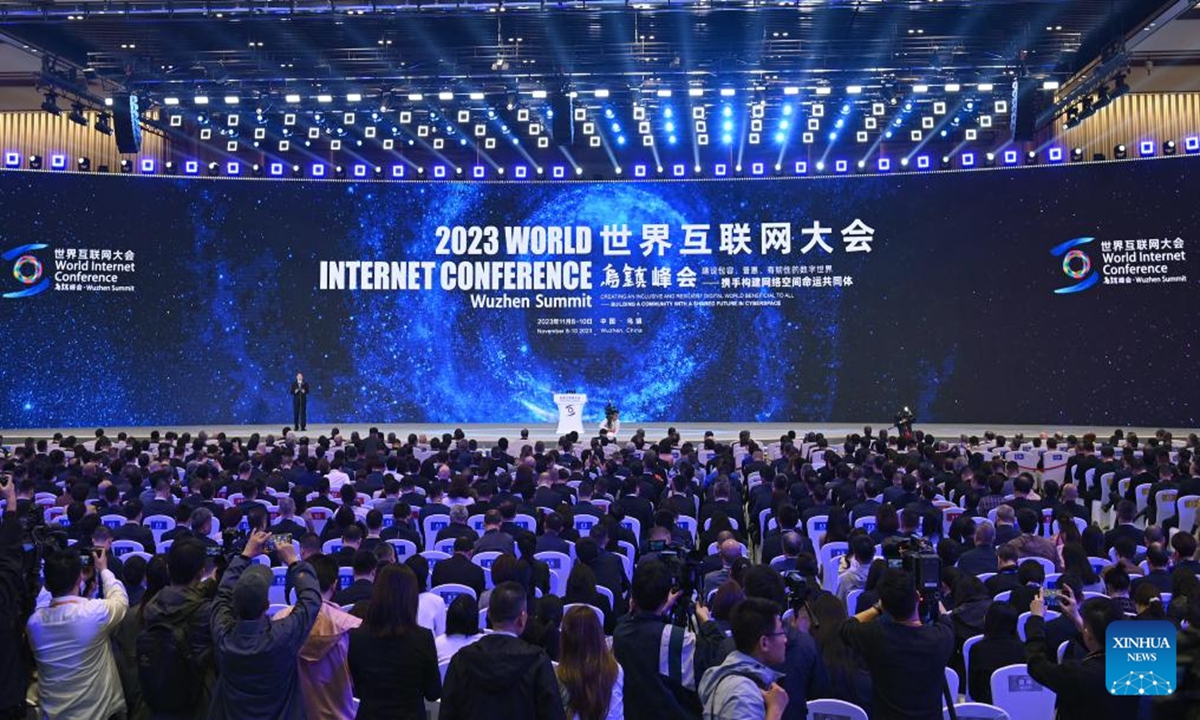Cyber governance should not be controlled by group politics, zero-sum thinking

The 2023 World Internet Conference (WIC) Wuzhen Summit opens in Wuzhen, east China's Zhejiang Province, Nov. 8, 2023. Photo: Xinhua
On Wednesday, the 2023 World Internet Conference (WIC) Wuzhen Summit was kicked off in Zhejiang Province, East China. With the theme "Creating an Inclusive and Resilient Digital World Beneficial to All: Building a Community with a Shared Future in Cyberspace," the summit will last until November 10.
Over the past 10 years, the WIC Wuzhen Summit has witnessed the advancement of China's internet industry. Since the first WIC Wuzhen Summit, nearly 12,000 participants from 172 countries and regions have attended the summit. China has now become the world's largest internet market, with the most internet users and mobile internet users, as well as the most active internet technology and application innovation ecosystem.
During the past decade, the WIC Wuzhen Summit has contributed Chinese wisdom to the transformation of global cyberspace governance and provided Chinese solutions. Shen Yi, director of the Research Institution for Global Cyberspace Governance at Fudan University, told the Global Times that "China, based on respecting the core interests and concerns of all parties, fully leverages its advantages and experiences in information technology, digital economy, and cyberspace governance, attracting like-minded countries and enterprises worldwide to jointly explore solutions to various challenges in global cyberspace governance through equal consultations."
Replacing cyber hegemony with a community with a shared future in cyberspace, replacing exclusive clubs with principles of extensive consultation, joint contribution, and shared benefits, and resolving challenges in security, development, and cultural exchange with cyberspace governance are the embodiment of Chinese wisdom and the core of China's widely welcomed concepts, experts said. China's vision is welcomed because it represents the common interests and shared needs of the majority of countries. Developing countries are not willing to accept the hierarchical treatment in the field of the internet by developed countries. China's solutions to cyberspace governance are truly based on mutually beneficial, equal, and sustainable cooperation.
Some American media outlets criticize China's internet regulations from an ideological perspective. These criticisms are related to the principles upheld by the US in handling internet governance issues, such as the principle of hegemony, and the "America First" doctrine. Li Haidong, a professor at the Institute of International Relations at the China Foreign Affairs University, said that, "Any country that challenges the US' dominance and rule-making power in the digital world would be criticized, distorted, and vilified by the US. China does not welcome this, nor do other countries."
Since the Cold War, the US has never concealed the fact that it is a hegemonic country. Its goal is to build cyber hegemony, achieve the asymmetric expansion of American and its core allies' power, and squeeze the sovereignty and interests of other countries. Shen believes that the unrestrained and bottomless surveillance of global cyberspace, without boundaries, by the US exceeds the reasonable needs of national security and undermines trust in cyberspace. The US cyber hegemony threatens the security and stability of global cyberspace and poses a serious challenge to the sovereignty, security, and development interests of other countries.
Currently, the iteration cycle of emerging network technologies and applications is becoming shorter, and non-traditional security issues, represented by network security, are becoming more prominent. Today, it is impossible for any country to dominate the world alone. The sincere cooperation and coordinated response of all countries in the world are the trend. Li believes that if the digital world is filled with zero-sum thinking and politicized small circles, the internet will no longer be a bridge connecting all parties and promoting mutual understanding, but a weapon to suppress competitors and create crises and turmoil in other countries.
The WIC Wuzhen Summit proves that China emphasizes the integration of the internet world and attaches great importance to its inclusiveness. This inclusiveness is not only for China's development but also for that of the world. Washington's pursuit of small circles in the internet field undoubtedly undermines the integration of the internet. We call on the US to do less to disrupt the order of the internet world. The internet should not be influenced by the logic of group politics and zero-sum games.
Photos
Related Stories
Copyright © 2023 People's Daily Online. All Rights Reserved.









